Charleston Currents #12.37 | Aug. 3, 2020
LOTS OF RIBBONS. A group of artists offered free outdoor art in the Hampton Park and Wagener Terrace front yards from about the time the John C. Calhoun statue came down in June until the end of July. You could still see this work by Jarod Charzewski on Sunday at 35 Race St. Learn more about the outdoor art show from this story in the Charleston City Paper. If you’ve got a photo our readers should see, send it along to: editor@charlestoncurrents.com. Photo by Andy Brack.
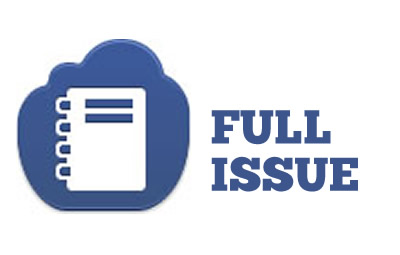 TODAY’S FOCUS: Book outlines how 4 presidents tackled difficult situations
TODAY’S FOCUS: Book outlines how 4 presidents tackled difficult situations
COMMENTARY, Brack: Three months before national election, Trump is scared
IN THE SPOTLIGHT: Morris Financial Concepts, Inc.
NEWS BRIEFS: Tropical storm may turn into hurricane later today
FEEDBACK: Send us your thoughts
MYSTERY PHOTO: Did it move?
CALENDAR: Redux to show Williams’s art Aug. 10-28
S.C. ENCYCLOPEDIA: Lords Proprietors of Carolina
Book outlines how 4 presidents tackled difficult situations
By Elliott Brack, republished with permission | It’s fun to read books by Doris Kearns Goodwin. Here’s why: the author writes intelligently, figuring that the readers know basic facts about the overall book subject. So, she cuts to the quick, giving you new insights and facts about the stories you already know. You don’t waste time hearing her version of what you already knew.
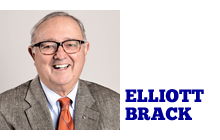 Her most recent book is Leadership in Turbulent Times, concentrating on the key turning points of the tenure of four presidents: Lincoln, both Roosevelts, and Lyndon Johnson.
Her most recent book is Leadership in Turbulent Times, concentrating on the key turning points of the tenure of four presidents: Lincoln, both Roosevelts, and Lyndon Johnson.
Her insight particularly of not why, but how, these four presidents made monumental decisions, is the key takeaway from this recent book of hers. Each of these four great presidents had to search hard for how they could take action in a crisis. All four were wary of taking extra-ordinary action when precedents had not been set before. Each sought legal means, often delicate points to move when our country faced a difficult crisis.
Ms. Goodwin’s book offers a sharp contrast to the manner that current President Donald Trump has taken in delicate situations, while often circumventing previous protocols and policies.
One situation Theodore Roosevelt found the nation in soon after taking office was a far-reaching anthracite coal strike. It lasted more than six months. As the year moved closer to winter, stores of coal were running seriously low, meaning that people especially in the Northeast, heavily dependent on coal, would suffer without heat in winter.
Meanwhile, Teddy Roosevelt was concerned about the rampant consolidation of corporate wealth, as a result of the Industrial Revolution. Roosevelt felt that its speed and size “accentuates the need of the Government to have some power of supervision and regulation over such corporations.” Eventually, he found a way to bring the two sides together, and eventually solved the strike, and kept people in the Northeast warm. But he made sure that he took only legal means to make this happen.
Roosevelt understood that only the government itself could bring the two sides to the table. That was something new for this country, that is, the government taking such leads to solve problems that neither big business and labor wanted the government to step in on. But, Roosevelt knew that the two sides would have taken such steps. Eventually, this led to the government becoming involved and Roosevelt’s “trust busting” of Standard Oil, and other corporations and monopolies that held our nation in a stranglehold for essential goods and services.
 This step that Theodore Roosevelt started can bring us to the modern times. Today we are not threatened by Standard Oil monopolizing the energy market. Today we see information technology companies like Amazon, Google, Microsoft, Facebook and other modern services, gaining more and more of a stranglehold on our information. Do they need breaking up?
This step that Theodore Roosevelt started can bring us to the modern times. Today we are not threatened by Standard Oil monopolizing the energy market. Today we see information technology companies like Amazon, Google, Microsoft, Facebook and other modern services, gaining more and more of a stranglehold on our information. Do they need breaking up?
Meanwhile, financial institutions are even more massive than ever before. Do we need to wake up and insist that the banks have better controls, and not be so big?
So the question: is it time for our government to become more aggressive against these private companies and more on the side of the individual, since these modern entities amass more power and dominate their fields and seem to grow even larger each day? Are they gaining too much power?
Sadly, it appears that no one on the horizon has stepped forward to curtail the power of today’s high-tech companies, Big Banks, or any other industry that is becoming humongous in many fields.
Is bigger better? Perhaps Doris Kearns Goodwin might tackle that subject next.
Veteran Georgia newspaperman Elliott Brack is editor and publisher of GwinnettForum.com, where this commentary first appeared. Have a comment? Send to: editor@charlestoncurrents.com
Three months before national election, Trump is scared
By Andy Brack, editor and publisher | Blustery Donald Trump is scared he’ll lose the November presidential election. He’s mortified of being called the worst thing in the book: The biggest loser.
 On Thursday as three presidents and the nation remembered the consequential life of U.S. Rep. John Lewis at an Atlanta funeral, the current president of the United States schemed to get into headlines by actually suggesting something expected in banana republics — not our democracy. He had the gall to float the idea that the November election should be postponed.
On Thursday as three presidents and the nation remembered the consequential life of U.S. Rep. John Lewis at an Atlanta funeral, the current president of the United States schemed to get into headlines by actually suggesting something expected in banana republics — not our democracy. He had the gall to float the idea that the November election should be postponed.
And thereby, he showed his political cards — he’s frightened, desperately trying to figure out a way to do anything to lower expectations, make excuses, suppress turnout, slyly encourage outside influence and interfere with fair and free elections.
No, Mr. President. You’re wrong. You need to stop the great election con of 2020 and get down to trying to win, if that’s what you want, not take us deeper into the swamp of malfeasance by corrupting the process.
You can’t stop or change the date of the election “until people can properly, securely and safely vote,” as you’ve said. People can now vote with confidence thanks to increased election vigilance, new machines and new security after the 2016 election, which you took despite losing the popular vote.
“Article II of the Constitution empowers Congress to choose the timing of the general election,” according to The New York Times. Furthermore, “an 1845 federal law fixed the date as the first Tuesday after the first Monday in November.” With Democrats in control of the U.S. House, no bill will be signed into law to move the election.
Republicans on Capitol Hill isolated Trump on his banana-republic idea of changing the election, a few meekly spouting that he probably was kidding. Other supporters roundly criticized the suggestion.
“Never in the history of the country, through wars, depressions and the Civil War, have we ever not had a federally scheduled election on time,” said Senate Majority Leader Mitch McConnell, R-Kentucky. “We’ll find a way to do that again this Nov. 3.”
U.S. Sen. Lindsey Graham, R-S.C., added during a Senate hearing, “In South Carolina, we had a very large primary in June and were able to do it in person. I think we can be able to safely vote in person in November. I think delaying the election probably wouldn’t be a good idea.”
The consequence of not having free elections at a certain time was clear to Abraham Lincoln in 1864 during a civil war ripping apart the country: “We can not have free government without elections; and if the rebellion could force us to forego, or postpone a national election, it might fairly claim to have already conquered and ruined us.”
The notion of postponing elections is a red herring floated by a panicked elected official who sees the economy caving because of his failure of leadership during a time of pandemic. Rather than fixing problems, he obfuscates, squirting out the black ink of an octopus to try to slither towards safety.
Trump should start emulating a man that he has tried to harm for years, former President Barack Obama, who spoke eloquently about the need to expand voting and freedom, not try to fix elections, during the Thursday funeral for Lewis. Referring to past hurdles for voting for blacks before the civil rights movement, Obama said:
“We may no longer have to guess the number of jelly beans in a jar in order to cast a ballot. But even as we sit here, there are those in power (that) are doing their darnedest to discourage people from voting — by closing polling locations, and targeting minorities and students with restrictive ID laws, and attacking our voting rights with surgical precision, even undermining the Postal Service in the run-up to an election that is going to be dependent on mailed-in ballots so people don’t get sick.
Obama then called on elected leaders to strengthen a recently-weakened federal Voting Rights Act to encourage turnout on election day by automatically registering all Americans to vote, adding polling places and making election day a national holiday.
Voting is sacred to democracy. Fiddling with it shows a loathing disdain for freedom. Knock it off, Mr. President.
Andy Brack is editor and publisher of Charleston Currents. Have a comment? Have a comment? Send to: editor@charlestoncurrents.com.
Morris Financial Concepts, Inc.
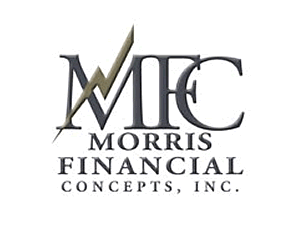 The public spiritedness of our sponsors allows us to bring Charleston Currents to you at no cost to readers. Morris Financial Concepts, Inc., is a nationally recognized, fee-only financial consulting firm that helps you identify and align your resources, values and goals to achieve an enriched life.
The public spiritedness of our sponsors allows us to bring Charleston Currents to you at no cost to readers. Morris Financial Concepts, Inc., is a nationally recognized, fee-only financial consulting firm that helps you identify and align your resources, values and goals to achieve an enriched life.
We do not accept commissions or compensation related to the products and service we recommend. Our counsel is based solely on what we believe is best for each client.
- Learn about founder and Charleston Currents columnist Kyra Morris and more about the consultancy at: Morris Financial Concepts, Inc.
- To meet all of our underwriters, click here.
Tropical storm may turn into hurricane later today
Staff reports | Officials are closely watching the churning in the Atlantic Ocean as Tropical Storm Isaias moves north towards the Carolinas coast. Heavy, spotty rain has been reported Monday morning.
The storm, near the Georgia-Florida line early this morning, is expected to be off the coast of Charleston by Monday night, bringing with it heavy rains. At 5 a.m., maximum sustained winds were 70 mph. It may gain enough power to be a hurricane, forecasters say, with the highest winds occurring off the coast. The probable landfall is Wilmington, N.C.
As of 8 a.m., Charleston was under a tropical storm warning, but a hurricane warning stretched from the South Santee River to Surf City, N.C. A storm surge warning is in effect from Edisto Island to the North Carolina line.
Helpful info:
- Four City of Charleston parking garages are open to cars for free through Tuesday. See the list.
- Charleston County’s three waterparks are closed Monday due to the storm. More.
Also in the news:
![]() Lots of great pets. If you’d like to see pictures of scores of great pets around the Charleston area, check out the City Paper’s special pet superlatives contest for the year. There are smiling dogs, frisky cats and more. Great photos.
Lots of great pets. If you’d like to see pictures of scores of great pets around the Charleston area, check out the City Paper’s special pet superlatives contest for the year. There are smiling dogs, frisky cats and more. Great photos.
Trident Tech to hold most classes online. Trident Technical College will only offer classes with skills-based, hands-on requirements on its campuses this fall. The majority of classes will be held online, the college recently announced. Fall classes start Aug. 24. The college is holding three virtual open houses next week where prospective and returning students and their families can learn more about the college and get their questions answered about attending this fall. For more information about the events or to register to attend, visit bit.ly/TTCopenhouse.
Experts say S.C. voting may be at risk due to cyberthreats. The computer-connected world poses an immediate threat to South Carolina’s and the nation’s elections and, thus, the future of democracy, elections and online experts say. “It’s a threat to our democracy when we have foreign governments, our own intelligence is saying, attempting to influence our elections,” Columbia Democratic Rep. Seth Rose said. “We should all be very, very terrified about that and be taking steps to do something about it.” Threat to democratic elections include voter tampering or voter registration tampering through hacking. But those attacks, elections experts say, are just the tip of the iceberg. Read more in this story from sister publication Statehouse Report.
More missing students found. While South Carolina public schools have tracked down 12,528 students in recent weeks, 3,557 students have not been in contact with their school since March 15 when the state moved to distance learning. Initially, the state Department of Education found tens of thousands of students hadn’t checked in with their teacher by April, raising alarms around the state. By June 29, an official report from the state Department of Education found 16,085 students were still unaccounted-for. By last week, Charleston County School District reported 40 missing students, down from 356 in June.
More than 195,000 South Caorlinians are still seeking unemployment. The 195,208 people are continuing to claim state jobless benefits in South Carolina. The figure dwarfs the number of those who filled out the state’s unemployment rolls during the Great Recession. Read more.
Pandemic kills 1,709 in S.C. so far. The S.C. Department of Health and Environmental Control on Sunday announced 1,110 new confirmed cases of coronavirus and an additional 27 deaths. Since March, the state has recorded 91,257 confirmed cases and 1,709 confirmed deaths. The percentage of positive COVID-19 tests dropped to 15.2 percent by Sunday. More.
Statehouse Report’s Lindsay Street contributed to this section. Have a comment? Send to: editor@charlestoncurrents.com
Got something to say? Let us know by mail or email
We’d love to get your impact in one or more ways:
Send us a letter: We love hearing from readers. Comments are limited to 250 words or less. Please include your name and contact information. Send your letters to: editor@charlestoncurrents.com. | Read our feedback policy.
Tell us what you love about the Lowcountry. Send a short comment – 100 words to 150 words – that describes something you really enjoy about the Lowcountry. It can be big or small. It can be a place, a thing or something you see. It might be the bakery where you get a morning croissant or a business or government entity doing a good job. We’ll highlight your entry in a coming issue of Charleston Currents. We look forward to hearing from you.
Did it move?
There’s something a little different about this building. It used to be in a different place than it is today. Did it move, or what? Send your best guess to editor@charlestoncurrents.com. And don’t forget to include your name and the town in which you live.
 Our most recent mystery, “Flags adorn impressive, grand entrance,” shows the historic and sumptuous Willcox Hotel in Aiken, which was named the 10th best resort hotel in the South by Travel + Leisure magazine in 2020. “The Willcox has historic southern charm enough to satisfy Scarlett O’Hara,” the magazine says. “Each of the 22 guest quarters are classic but never fussy, with four-poster beds, stitched floral pillows, and double-height paned windows framed by painted wood plantation shutters.”
Our most recent mystery, “Flags adorn impressive, grand entrance,” shows the historic and sumptuous Willcox Hotel in Aiken, which was named the 10th best resort hotel in the South by Travel + Leisure magazine in 2020. “The Willcox has historic southern charm enough to satisfy Scarlett O’Hara,” the magazine says. “Each of the 22 guest quarters are classic but never fussy, with four-poster beds, stitched floral pillows, and double-height paned windows framed by painted wood plantation shutters.”
Congratulations to eagle-eyed sleuths who identified the hotel: Boykin Beard of Camden; Marnie Huger of Richmond, Va.; Chris Brooks of Mount Pleasant; Allan Peel of San Antonio, Texas; George Graf of Palmyra, Va.; Jay Altman of Columbia; and Anne Semmes.
Peel offered this context: “Originally built in 1898 by Frederick Sugden Willcox as the family home, it also served as the location of Frederick’s catering company, which he established after coming to America from Cheshire, England, in 1891 to be a caterer for the Old Highland Park Hotel. When the Highland burned down in 1898, the influential guests of the Highland, being familiar with Frederick’s fine cuisine, convinced him to open a small hotel of his own … shortly after which The Willcox Inn welcomed its first guest in 1900.
“As demand for rooms increased, the small hotel was expanded in 1906 and again in 1928. It had been operated by the Willcox family as an internationally-renowned hotel as late as 1957, and has seen many famous and elite guests enter its lobby, including, amongst many others, Franklin D. Roosevelt, Winston Churchill and Harold Vanderbilt. At times, demand for rooms was so high that the hotel had to frequently turn down booking requests from many influential visitors, including one from the Duke of Windsor (former King Edward VIII) during a crowded Masters Week in Aiken. This 22-room, colonial revival style building was added to the U.S. National Register of Historic Places on March 12, 1982.”
- Send us a mystery: If you have a photo that you believe will stump readers, send it along (but make sure to tell us what it is because it may stump us too!) Send it along to editor@charlestoncurrents.com.
Redux to show Williams’s art Aug. 10-28
Redux Contemporary Art Center in Charleston will present Studio Works (2018-present) as an Ag. 10-28 solo exhibition featuring the work of North Charleston artist Fletcher Williams III.
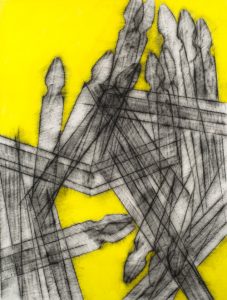
Turmeric No. 3, Fletcher Williams III, . Dye and Acrylic on Paper, 50x38in, 2020 Photo: Rick Rhodes Photography
This exhibition will feature a selection of recent works on paper pulled directly from Williams’s studio, according to a press release. Many are on display for the first time, and provide a first-hand glimpse at how the artist practices techniques, experiments with color and compositions, and explores different materials and textures. Highlights include 50 black-and-white single pickets evocative of featureless portraits, small-scale exploratory studies, and a collection of color-saturated works painted in synthetic and natural greens, lush blues, and bold turmeric tones.
Williams, born in 1987, received his BFA from The Cooper Union and is a 2018 recipient of a Dean Collection St(art)up grant, which served as lead funding for Williams’s latest site-specific installation, Promiseland. His works engage the rituals and traditions of the American South with an interest in the way we seek to establish place and cultural identity. Williams often paints with Spanish moss, builds house-like structures with salvaged wood and tin roof, and fashions delicate sculptures out of handwoven palmetto roses. His work is both architectural and figural, tactile, and multisensory and unveils his curiosity for both people and places, material, and process.
Also on the calendar:
![]() Lowcountry Listens each Wednesday. Want some local music with real social distancing? Tune in each Wednesday at 6 p.m. to the Gaillard Center’s Lowcountry Listens program for new performances. To watch, go to the venue’s homepage, Facebook page or YouTube channel at 6 p.m. Wednesday. Each performance is recorded in the Martha and John M. Rivers Performance Hall and features four to five songs. On tap this week is Sarah White + Emily Curtis. Ahead:
Lowcountry Listens each Wednesday. Want some local music with real social distancing? Tune in each Wednesday at 6 p.m. to the Gaillard Center’s Lowcountry Listens program for new performances. To watch, go to the venue’s homepage, Facebook page or YouTube channel at 6 p.m. Wednesday. Each performance is recorded in the Martha and John M. Rivers Performance Hall and features four to five songs. On tap this week is Sarah White + Emily Curtis. Ahead:
- August 12 – Muscle Memory: Poetry & Jazz with Marcus Amaker and Quentin Baxter
- August 19 – Chaquis Maliq The EccentroSoul 1 Woman Band
- See shows from the first series.
Wine Down Wednesday: 5 p.m. to 7 p.m. on Aug. 5, Aug. 19. Old Towne Creek County Park will host this event in West Ashley with wine and live music — a perfect pairing to relax at midweek. Food truck fare will be available. Cost: 15. Limited to 150 people. Advanced registration required.
Online offerings:
- Gibbes Museum. You can enjoy lots of local art offerings through the website and social media accounts of the Gibbes Museum. At 10 a.m. on weekdays, the museum posts virtual readings and workshops on Facebook. Find more online.
- Avian Conservation Center. Access videos and live streaming presentations online to learn about what’s going on at the Center for Birds of Prey.
- Around the world. You can visit 500 museums across the world online through this Google amalgamation of sites.
If you have any online events, drop us a line (editor@charlestoncurrents.com) and make sure to put “Online event” in the subject line. Similarly, if you’ve got cool ideas for stuff to do while in isolation at home, send them our way.
Lords Proprietors of Carolina
King Charles II granted the land that became North and South Carolina to eight English noblemen in 1663. Before the government of King George II bought out the last owners in 1729, nearly fifty individuals owned or claimed to own these eight shares. South Carolina owes its formative beginnings to these shareholders and their joint colonial enterprise.
Most of the eight original proprietors had remained staunch supporters of the Stuart monarchy after the execution of King Charles I in 1649, and others changed sides to become key figures in the restoration of his son in 1660. The original proprietors gained both elevated rank in the English nobility and colonial property as rewards for this service. The titles of the eight initial owners reflect their rise: Edward Hyde, first earl of Clarendon; George Monck, first duke of Albemarle; William Craven, first earl of Craven; Anthony Ashley Cooper, first earl of Shaftesbury; John Berkeley, first baron Berkeley of Stratton, and his brother Sir William Berkeley, governor of Virginia; Sir George Carteret; and Sir John Colleton. No documentary evidence survives for the organization of the joint enterprise, but it is likely that it was suggested by Sir John Colleton, who ran its affairs in the early years until his death in 1667. A second charter in 1665 extinguished lingering claims from an earlier grant to Sir Robert Heath and extended the grant’s boundaries.
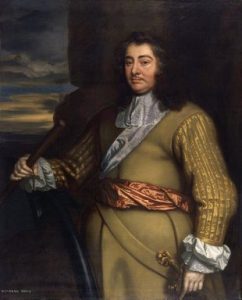
Moncks Corner is named for George Monck, first Duke of Albemarle. Date circa 1665-66. Via Wikipedia.
Settlement attempts by New Englanders and Barbadians failed, but the foundering colonial enterprise was rescued by Anthony Ashley Cooper in 1669. Ashley Cooper, who had not yet become the first earl of Shaftesbury, persuaded the other proprietors to fund an expedition from England that established the first permanent English settlement in South Carolina in 1670. None of the original proprietors ever set foot in their colony. Two of them, the earl of Clarendon and Sir William Berkeley, failed to contribute their shares to the financing of the joint enterprise. Sir Peter Colleton, who inherited his father’s share, and the five other active shareholders added the joint proprietorship of the Bahamas to their holdings in the same year that South Carolina was founded. A 1672 agreement to give the Albemarle region, which had been previously settled from neighboring Virginia, to Sir William Berkeley in exchange for his share in the proprietorship fell through. Protracted disputes over the ownership of his share and the Clarendon share necessitated an act of Parliament to assure clear title when the proprietorship was surrendered to the crown in 1729.
Ashley Cooper with assistance from John Locke, who served as secretary to the proprietorship from 1668 to 1675, wrote the Fundamental Constitutions as part of the preparations for the 1669 expedition. That document’s elaborate provisions provided a governing structure for the proprietorship as well as the colonial settlements. The group was to be headed by a palatine, whose substantial powers in naming governors and vetoing laws sometimes had a major impact in South Carolina in later years. The title “palatine” had its origins in the feudal powers of the prince/bishops of Durham, powers granted to the shareholders in their charters. The first three palatines, George Monck, John Berkeley, and Sir George Carteret, were more like figureheads during the years from 1669 to 1682 when the earl of Shaftesbury took the lead in managing their affairs and the fledgling South Carolina settlement.
English noblemen supported their opulent lifestyles from the rents from their landed estates, and the proprietors expected to profit handsomely from their vast new American holdings. They were quickly disappointed when in the early years the often-stubborn colonists did not repay the expenses of setting up the colony. Collection of quitrents on land granted to colonists was a continual problem. Dreams of wealth from gold and silver or the production of wine, silk, and olive oil proved all too elusive for the colony’s successive proprietary owners. Shares in the joint enterprise were bought and sold over the years, but none of the proprietors reaped much profit from their colonial investment.
Only the Colleton, Carteret, and Craven shares remained in the hands of the families of their original owners in 1729. Later generations of the Colleton family were resident South Carolinians at Fair Lawn Seignory on the upper Cooper River. John Carteret, earl of Granville, the great-great-grandson of the original owner, did not join the other seven shareholders in selling out to the crown and received the Granville District along North Carolina’s northern border as his eighth share in the colonial property.
John Archdale, who also served as one of South Carolina’s most effective proprietary governors, bought two different shares over the years. Because he was a Quaker, he placed the first in his son’s name, and he was subsequently disappointed when that son sold it when he came of age. In contrast to Archdale’s positive influence, another purchaser, Seth Sothel, brought disruption and discord when he briefly claimed the governor’s office in South Carolina in 1690.
Proprietary efforts to control South Carolina’s development were slightly more successful than their hoped-for profits. South Carolinians early on asserted an irritating independence. Attempts by royal officials to void the charter began as early as the 1680s in moves to tighten control over England’s colonies. From the South Carolinians’ point of view, the proprietors’ vetoes of their laws, their failure to adequately support the colony’s security, their cessation of further land grants at the same time that they reserved fifteen large tracts for proprietor’s baronies, and other grievances had “unhinged the frame of government.” In December 1719 the South Carolinians revolted against the proprietary regime and asked the crown to take direct control of the colony. A provisional royal governor arrived in 1721, and negotiations led to the 1729 surrender of the proprietors’ ownership of Carolina to the British government.
— From an entry by Charles H. Lesser. This entry has not been updated since 2016. To read more about this or 2,000 other entries about South Carolina, check out The South Carolina Encyclopedia, published in 2006 by USC Press. (Information used by permission.)
As more people stay home to deal with the coronavirus crisis, people are looking for things to do. You can find some fun things to do online in our calendar section below, but let us also encourage you to FORWARD your issue of Charleston Currents to your friends and encourage them to subscribe. It’s got a great price, as you know: Free! We hope they’ll enjoy our coverage.
- DONATE. Now also would be a great time to contribute as we deal with the crisis. In advance, thank you.
OUR UNDERWRITERS
Charleston Currents is an underwriter-supported weekly online journal of good news about the Charleston area and Lowcountry of South Carolina.
- Meet our underwriters
- To learn more about how your organization or business can benefit, click here to contact us. Or give us a holler on the phone at: 843.670.3996.
OUR TEAM
Charleston Currents offers insightful community comment and good news on events each week. It cuts through the information clutter to offer the best of what’s happening locally.
- Mailing address: 1316 Rutledge Avenue | Charleston, SC 29403
- Phone: 843.670.3996
Charleston Currents is provided to you weekly by:
- Editor and publisher: Andy Brack, 843.670.3996
- Contributing editor, common good, Fred Palm
- Contributing editor, money: Kyra Morris
- Contributing editor, Palmetto Poem: Marjory Wentworth
- Contributing editor, real estate: Digit Matheny
- Contributing photographer: Rob Byko
- Charleston Currents also uses content from the outstanding staff at the Charleston City Paper, a sister publication.
SUBSCRIBE FOR FREE
Subscriptions to Charleston Currents are free.
- Click here to subscribe.
- Unsubscribe. We don’t want to lose you as a reader of Charleston Currents, but if you must unsubscribe, you will have to do it through the email edition you receive. Just go to the bottom of any of your weekly newsletters and click the “unsubscribe” function. If that doesn’t work, please send us an email with the word “unsubscribe” in the subject line.
- © 2008-2020, City Paper Publishing, LLC. All rights reserved. Charleston Currents is published every Monday by City Paper Publishing LLC, 1316 Rutledge Ave., Charleston, SC 29403.


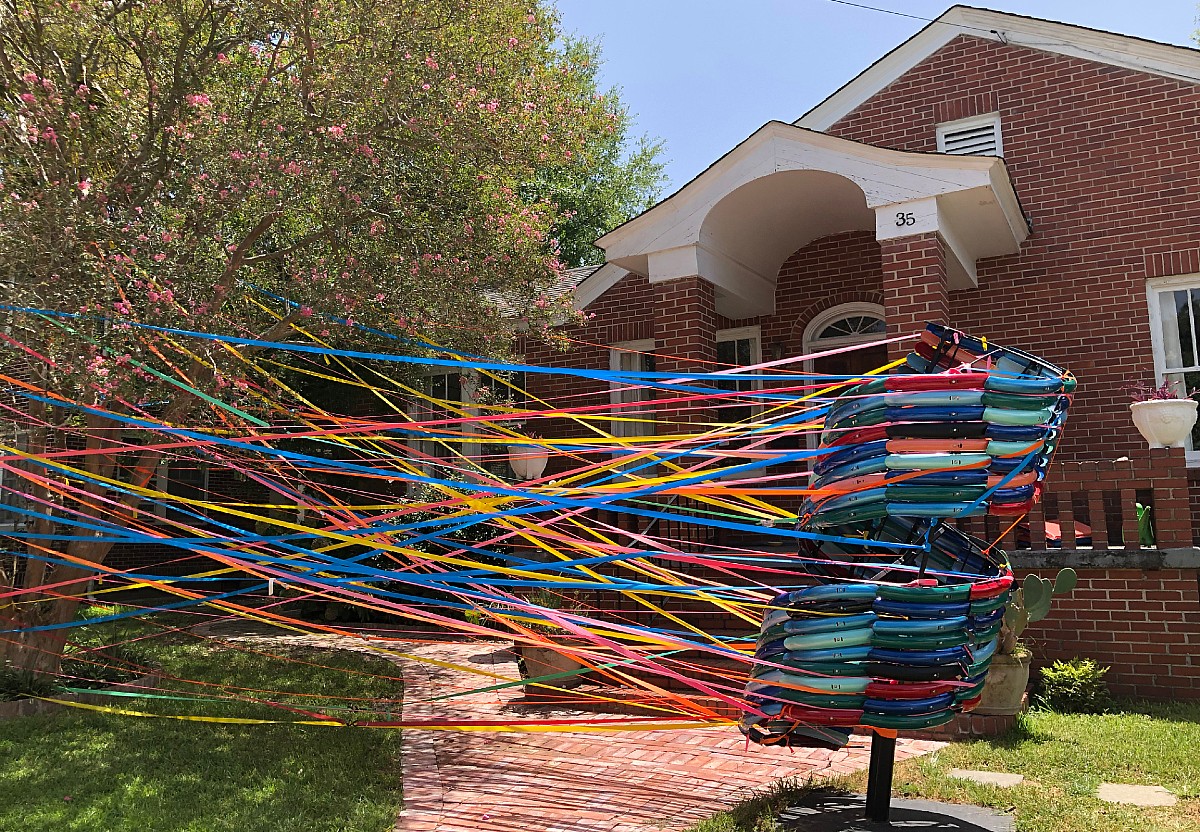
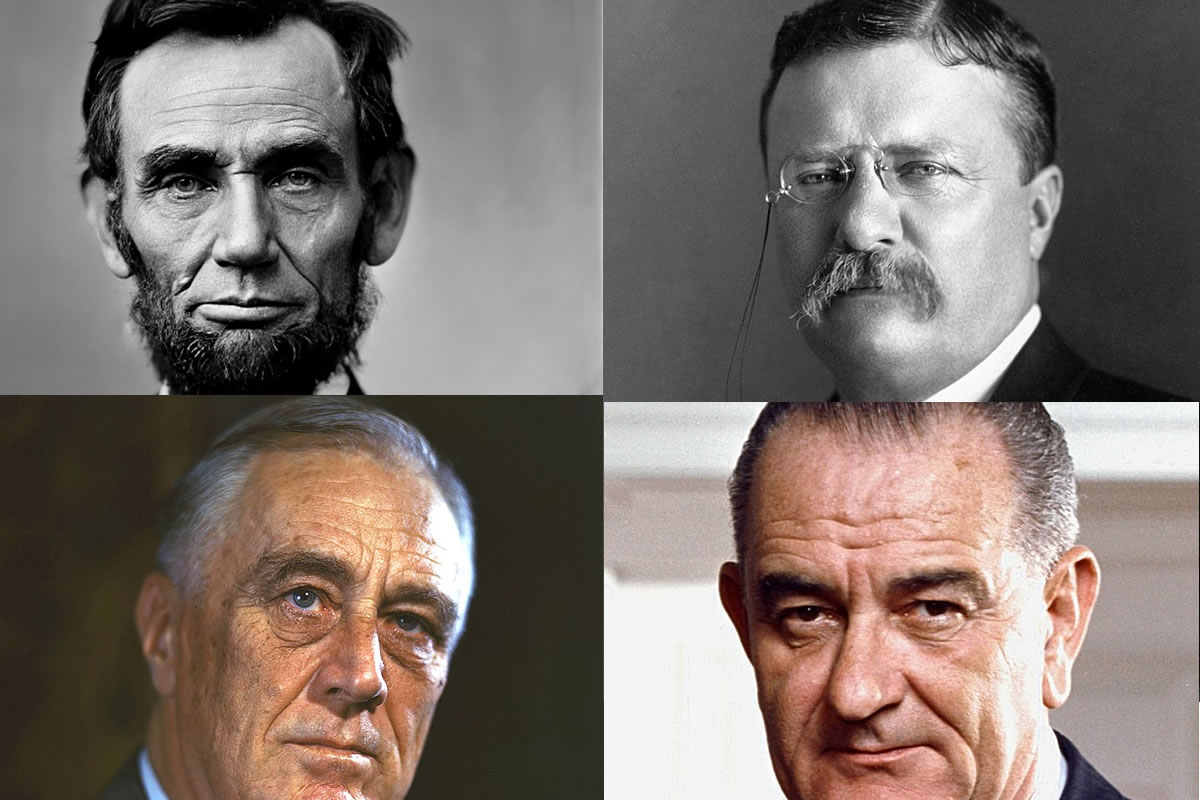
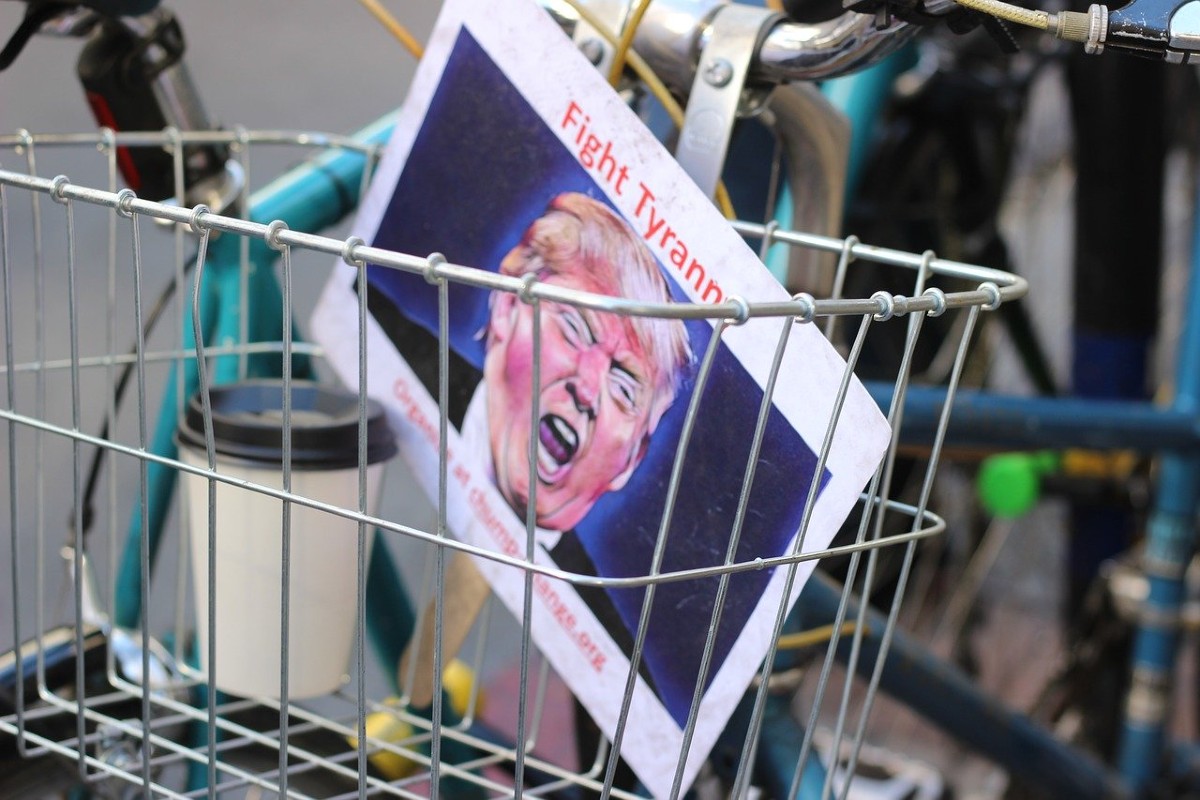
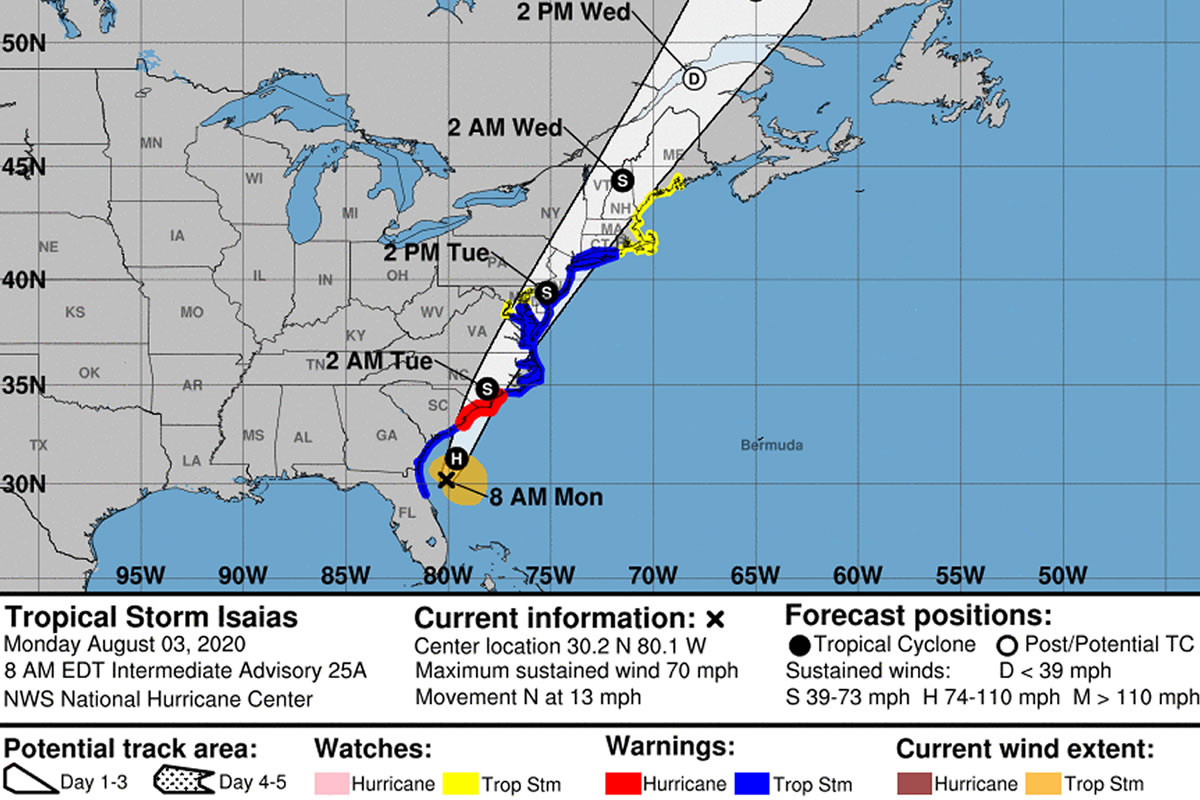
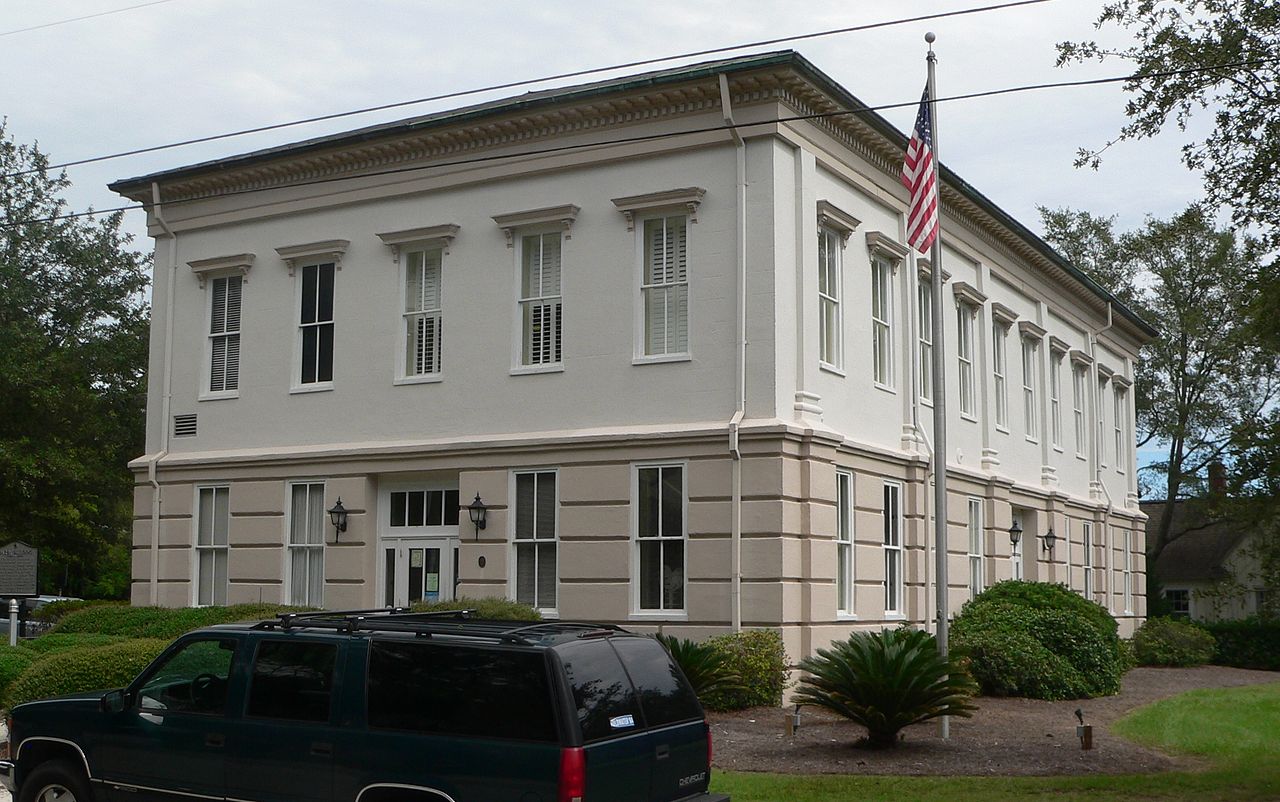

 We Can Do Better, South Carolina!
We Can Do Better, South Carolina!
























